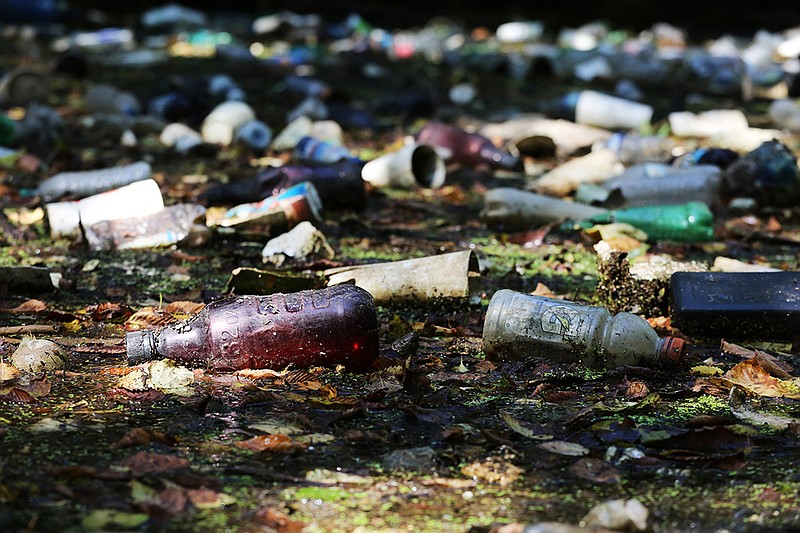Got a minute? Then go put your head in a trash can and look around.
Any trash can will do. If you can't find a trash can, look in a roadside ditch.
Or any major waterway, like our Chattanooga Creek.
I'll bet you a dollar to a doughnut they are filled with plastic bottles.
And aluminum cans.
And glass bottles.
Our bottle trash is everywhere.
"Tennesseans consume more than 4 billion beverage containers a year and recycle only 10 percent of them," said Marge Davis.
Davis is the grassroots coordinator of a magnificent idea that's trying to change that.
Look again in your trash can.
All those empty bottles and cans? All that waste?
It's not trash.
It's money.
And jobs.
And beautiful, clean water and land.
"Empties are full of opportunities," said Davis.
Davis's idea is this: the Tennessee Bottle Bill Project.
Affectionately known as TennCan, the legislation already has sponsors - thank you, state Sen. Frank Niceley - with a goal of being introduced in early 2019.
Here's how it works:
When you buy a bottle or can, 5 cents are added to the cost. (This is not a tax. I repeat: not a tax. And retailers? This doesn't affect you.)
A $1.29 Coke would then cost $1.34.
A six-pack goes from $7.99 to $8.29.
You drink your drink, but now, instead of trashing your bottles, you hold onto them and take them - along with all your other bottle trash - to one of the several newly built redemption centers nearby.
That extra nickel you paid? Here, you get it back. Run by churches, schools, individuals or any nonprofit, these redemption centers give you a 5-cent return on every bottle you bring in - your six-pack, your buddy's six-pack - which means you at least break even, or possibly make some extra money.
Or, even better, each redemption center is connected to a specific nonprofit. Instead of keeping that nickel return, you can donate it to your neighborhood school.
Or church.
Or veteran's group.
Or animal shelter.
Or library.
Remember, we Tennesseans consume 4 billion drink bottles a year.
See the potential?
"We're projecting at least $8 million a year in refunds to be donated," said Davis.
Beverage companies would pay 3/4 of a cent for each bottle, which would help fund the program. In return, they'd be investing in a program that would help recover nearly all parts of their packaging.
That's one reason why bottle bills are springing up across the nation and world; Maine's bottle bill has seen a sky-high public approval rate in the decades since first enacted. Davis talks about polls that show an 80 percent public approval rate.
In Britain, Coca-Cola announced in July its whole-hearted support for a deposit return plan there.
In Iowa, beer distributors collectively applaud - check out www.iwbda.org/container-deposit-law - their state's bottle deposit plan.
"We know from 50 years of bottle bills, the beverage industry will not be hurt from this bill," said Davis. "There may be some impacts, but they will be small and will certainly be offset by the public good."
Our bottle bill would create jobs. Some 500 redemption centers - that's the projection - will be staffed by some 1,800 workers.
It would support local manufacturers in desperate need of recycled, reprocessed material. Davis mentions Alcoa, the biggest aluminum maker around. The carpet folks in Dalton, in great need of PET plastic. Ashland City's Strategic Materials, the largest glass processor around.
Plus, we start to help the land and waterways heal.
Here in Tennessee, we have a drinking (bottle) problem. We drink our drink, then toss the bottle.
The effects of this, especially with single-use plastic waste, are devastating, clogging our waterways, polluting our oceans, insulting God's creation.
In these divisive times, here is a bill - an engaged, sum-greater-than-parts, roll-up-your-sleeve Victory-Gardenesque idea - that works for essentially everyone.
"This bill has been so carefully vetted, so thoroughly tweaked by the solid waste people, by recyclers, by the industry," said Davis, who's biked across the state to raise support.
What can we do?
"The best thing people can do is to contact their legislators," said Davis.
Visit capitol.tn.gov or call 615-741-6239.
David Cook writes a Sunday column and can be reached at dcook@timesfreepress.com or 423-757-6329. Follow him on Facebook at DavidCookTFP.

